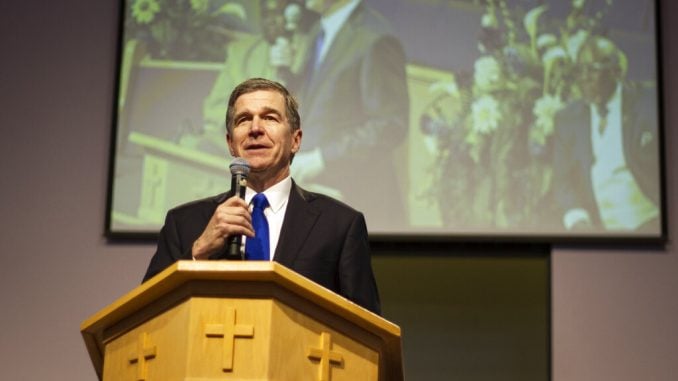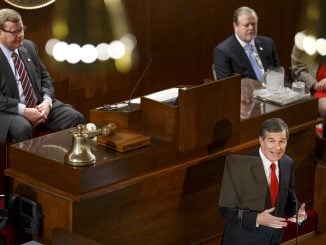
RALEIGH — After more than a month of waiting for the other side to flinch in budget negotiations, Minority Leader Darren Jackson (D-Wake) delivered a letter to Senate Leader Phil Berger (R-Eden) and Speaker Tim Moore (R-Kings Mountain) saying he has 51 signatures from House Democrats who pledge not to break with the party to override Gov. Cooper’s veto of the Republican budget.
A tweet from Jackson with images of the letter said, “The votes are not there for an override. Not in July. Not in August. They won’t be there in October. It’s time to negotiate.”
Republicans say there is no way to negotiate with Cooper as long as he clings to a Medicaid-expansion-or-nothing ultimatum. Democrats insist that it is the Republicans who are giving an ultimatum because they will not agree to include Medicaid expansion in the budget discussions.
A budget was supposed to be enacted by the time the current fiscal year began July 1, but Cooper vetoed the legislature’s plan a few days earlier, citing the presence of corporate tax cuts and smaller-than-desired teacher pay raises and the absence of Medicaid expansion.
Unlike the previous six years, Republican majorities in the House and Senate are no longer veto-proof — meaning they need Democratic help to overcome whatever Cooper blocks.
Moore and other Republicans have been promoting local initiatives in the two-year spending plan by traveling to districts where Democrat lawmakers haven’t fully committed to upholding the veto. He needs to convince seven Democrats to cross the aisle despite all but four having signed the pledge.
“I’m going to continue to try to convince Democrats that this is a great budget that they should vote for,” Moore said. He said the fact that four Democrats didn’t put their name to the letter is a sign “there actually is some bipartisan support for the override.”
On Twitter, Cooper’s communications director Sadie Weiner and the “Senator Berger Press Shop” account traded comments on where the blame for the impasse lies.
“This is getting exhausting,” Berger’s press account tweeted, “The Governor will not sign any budget unless the legislature first passes Medicaid expansion. He has said so repeatedly. It’s awfully difficult to negotiate when the Governor won’t sign the final product no matter what.”
Cooper has been holding his own made-for-media discussions to press his case for expanding Medicaid. He visited a child care center in Shelby on Thursday. Cooper has said expansion will help improve health care for mothers who are child care workers, which in turn will benefit the workers’ own children. He is counting on the fact that enough legislative Democrats agree with this mission and will not yield to Republican promises for budget items in their home districts.
“We are committed to sustaining Gov. Roy Cooper’s veto of the state budget,” the Aug. 7 letter from House Democrats reads. “The votes are not there to override and staying in session for weeks waiting for Democrats to miss votes because of illness or family and work obligations is a waste of taxpayer dollars and disrespectful to the voters who elected Gov. Cooper and this more balanced General Assembly.”
Continuing the competing statewide events, Berger and Moore will traveled to Guilford County Aug. 13 to hold an event at North Carolina A&T State University with lawmakers to “promote a $36 million budget investment into capital projects, doctoral programs, and research grants on the campus in Greensboro, N.C.”
Associated Press contributed to this article


